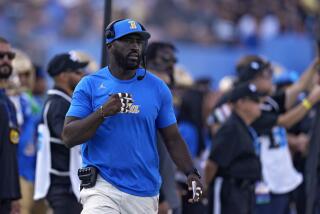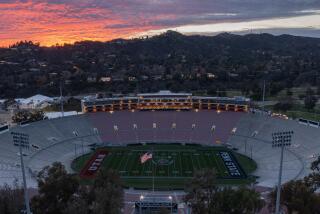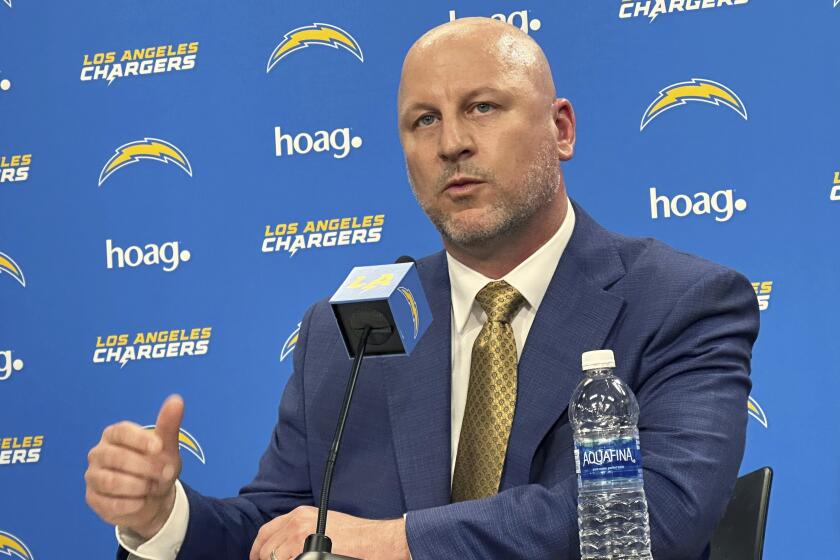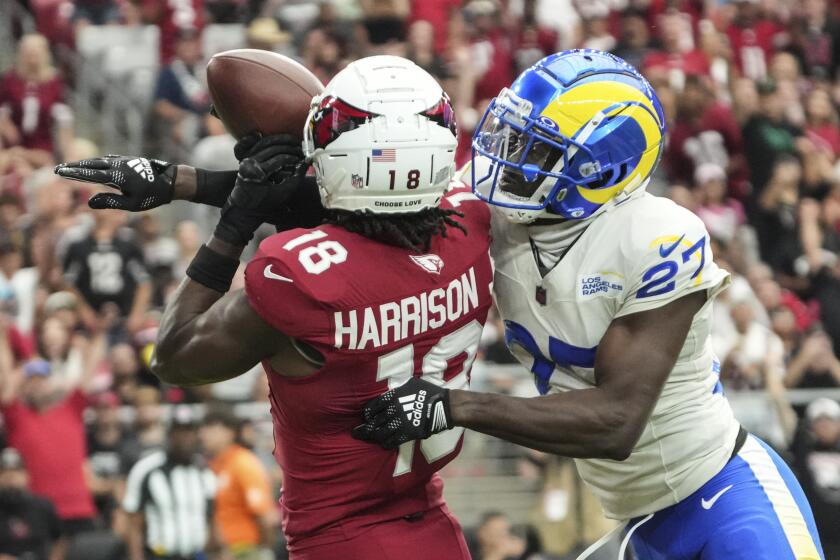USC considers leaving Coliseum for Rose Bowl
No matter the outcome of Saturday’s game between USC and UCLA, the Trojans could wind up in the Rose Bowl.
For good.
Frustrated by lack of progress on a lease agreement with the Coliseum Commission -- one that would allow the school to run and renovate the venerable Los Angeles Memorial Coliseum -- USC is negotiating with the Rose Bowl to begin playing home games in Pasadena next fall.
While a deal with the Pasadena stadium is not complete, a potential USC lease agreement is on the agenda for a Dec. 6 meeting of the Rose Bowl Operating Co. The school’s two-year lease with the Coliseum expires after Saturday’s game.
Some insiders have dismissed USC’s talks with the Rose Bowl as a negotiating ploy, saying it’s highly unlikely the school would ever leave a stadium that’s practically part of its campus. But others point to the number of teams that have left the Coliseum over the years and say USC is likely to uproot if there’s no significant progress with the commission.
“We’ve been a loyal, faithful tenant of the Coliseum for 80 years, and our goal is to continue playing in the Coliseum for another 80 years,” said Todd R. Dickey, USC’s senior vice president for administration. “But in order to do that, the Coliseum has to be improved. It needs to be repaired and restored. And we’ve offered to make those improvements, not just to hand the money over to the Coliseum Commission, but for the university to actually operate the facility.”
That offer: A minimum of $100 million over 10 years toward the stadium’s repair and restoration. As part of the deal, the school would be in charge of running the venue.
The commission has repeatedly rejected that proposal, although it did comply with a request USC made in September for a new two-year lease, an agreement that has not been signed.
“As far as we’re concerned, they asked us for two years and the commission gave it to them,” said Pat Lynch, the Coliseum’s general manager. “If they asked us for five years, we’d give them five. If they asked us for 10, we’d give them 10. We can’t read their minds.”
USC officials say those are simply long-term leases, at six games a year, not improvements to the facility or a master lease.
The future of the Coliseum’s relationship with USC will be the central focus of the commission’s monthly meeting next Wednesday.
“We certainly hope they don’t leave, and we don’t know what we’ve done here other than reject the entirety of their master-lease proposal,” Lynch said. “We, as a group, told them what our concerns were. Here’s our plan. Here’s what we want to do. We recognize there’s a way to get that done.”
The commission’s major concern: Turning over the keys to a historic landmark that some believe still has the potential to generate millions of revenue in major international soccer games and naming rights. There’s also the element, some political observers have suggested, that commissioners would like to avoid making themselves superfluous.
Los Angeles Mayor Antonio Villaraigosa is “absolutely committed to keeping the Trojans in South Los Angeles,” according to Matt Szabo, a mayoral press secretary.
“USC football is one of the most important economic engines in South L.A. and the mayor has no interest in seeing those jobs desert the city for Pasadena,” Szabo said.
David Israel, a Coliseum commissioner, questioned the school’s timing in raising the issue now, mere days before a pivotal game between USC and UCLA.
“I’m not going to engage in conversations in this and upstage the game,” Israel said. “The players and the coaches and the students are what’s important this week. I think bringing it up now is a terrible disservice to them.”
So far, the crosstown rivals have been cooperative. They used to share the Coliseum, and USC received permission from UCLA before it opened negotiations with the Rose Bowl. Those discussions have now touched on specific issues such as locker rooms -- the Trojans would take over the locker room visitors now use, and pay for the construction of a third one -- as well as signage and stadium color schemes.
UCLA noted in a statement released late Tuesday that it was “willing to review any proposal regarding an additional tenant.” It also noted that its current lease, which runs through 2023, protects its position as the primary tenant.
In the past, various neighborhood associations and preservationists have objected to proposed Rose Bowl renovations in the name of bringing the NFL to Pasadena. A measure on Pasadena’s ballot last year allowing the NFL to enter a years-long contract with the Rose Bowl was defeated in a landslide, with 72% of voters opposing the initiative.
But City Manager Cynthia Kurtz said the notion of USC playing at the Rose Bowl would likely be well received by many Pasadena residents, although there have been no community discussions on the subject.
“College football is usually a pretty well mannered crowd that knows how to move about the city,” Kurtz said. “It doesn’t cause nearly the traffic problems we have when we have a large concert where nobody knows where the Rose Bowl is, and they wander all over town trying to find it.”
Also, Kurtz added, there are plenty of USC supporters who live in Pasadena. “Every time there’s a local team debate, there are equal numbers of blue and red jerseys there,” she said.
For USC to make such a move, it would require approval from the 13-member Rose Bowl Operating Co., UCLA and the Pasadena City Council.
“Having another tenant the quality of USC playing all their home games at the Rose Bowl would be a very positive development,” said Bill Thomson, president of the Rose Bowl Operating Co. “But we’re not going to do something without UCLA’s full agreement.”
Thomson noted that USC’s discussions have been with Rose Bowl general manager Darryl Dunn, not the company.
Said Dunn: “We recognize the history of USC and the Coliseum, but at the end of the day if USC needs a place to play we’ll try to work something out with them.”
However, he added, “If it doesn’t work for UCLA, it’s not going to work for us.”
USC’s Dickey said, “Our first choice is to play at the Coliseum. However, the Coliseum needs some significant improvements. The sound system is barely audible, the video system is failing, the bathrooms need upgrades, the entrances, the seats, the lighting, just about everything needs work.”
USC football Coach Pete Carroll declined to give an opinion about the possible move but said he thought of the Coliseum as a “second home.”
“We’ve loved playing at the Coliseum and we love playing in the Rose Bowl,” he added. “So we’ll see what happens.”
Trojans players reacted more emotionally. “You can’t take away the Coliseum,” junior offensive lineman Jeff Byers said. “I feel like that’s the tradition of SC. I would feel like that’s a big mistake by the school if they did. . . . It’s so close to campus and the place where we play, where we’ve won, where we’re successful. It’s kind of like it’s our Coliseum. The Rose Bowl is something to look forward to at the end of the year.”
Said Trojans linebacker Keith Rivers: “Our goal every year is to own the Rose Bowl, but the Coliseum . . . that’s where all the great ones played. The Olympics, everything’s gone down there. It’s my home. I wouldn’t want to change that.”
UCLA and the NFL’s Rams and Raiders have left the Coliseum in the last 30 years, and the National Hockey League’s Kings and NBA’s Lakers and Clippers have left the Sports Arena, which is also under Coliseum Commission control.
USC and UCLA shared the Coliseum from 1928 through 1981, when the Bruins relocated to Pasadena. USC began playing football at the Coliseum in 1923, but the school actually played in the Rose Bowl the year before that.
In fact, on Oct. 28, 1922, USC played host to California in the first football game played in that stadium.
Times staff writers Gary Klein and Steve Hymon contributed to this report.
More to Read
Go beyond the scoreboard
Get the latest on L.A.'s teams in the daily Sports Report newsletter.
You may occasionally receive promotional content from the Los Angeles Times.











